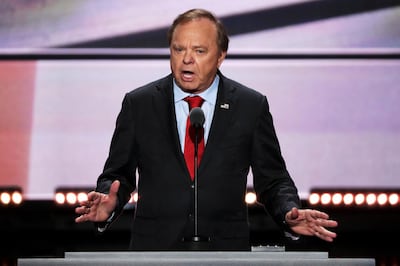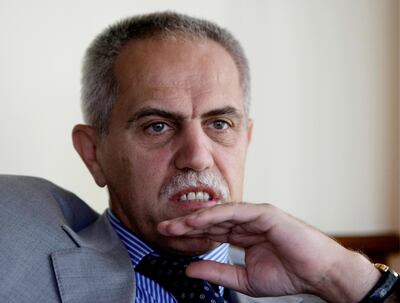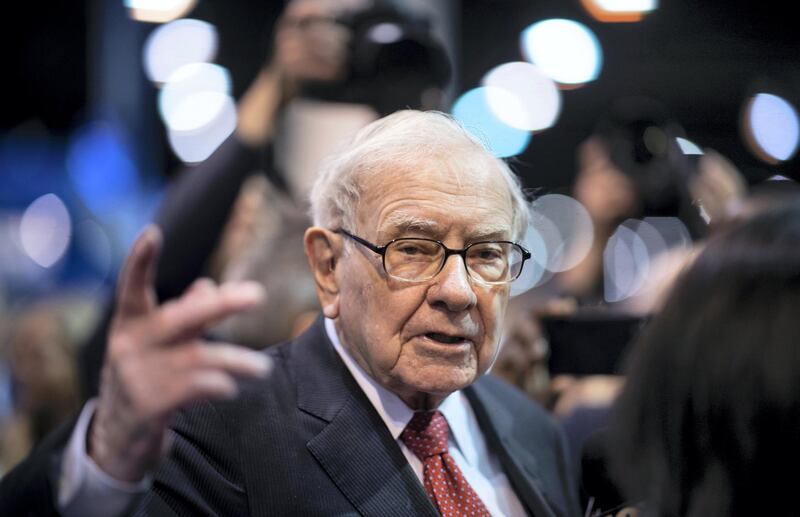Warren Buffett
Warren Buffett has described his collection of businesses as a “Niagara of cash generation". Right now, he can’t keep up with the deluge.
Berkshire Hathaway reached a new record in the second quarter with $122bn in cash, beating out its previous high set at the end of 2017. Despite having a good problem on his hands, Mr Buffett has been struggling to find enough well-priced opportunities to keep up the growth that allowed him to beat broader markets for decades.
Mr Buffett was a net seller of stocks in the quarter and even slowed down purchases of Berkshire’s own shares. The company bought back about $400m, down from $1.7bn in the first three months of the year. Berkshire’s board changed its buyback policy last year as another way to deploy the mammoth cash pile.
Mr Buffett may not like the new accounting rules that cause swings in his stock portfolio to be reflected in net income, but they helped lift profit in the second quarter. The company had $7.9bn in investment gains, up 55 per cent from a year earlier. That drove net income to a 17 per cent jump.
Clemens Toennies
Clemens Toennies has stepped down for three months as chairman of German Bundesliga club Schalke following widespread condemnation of alleged racist comments he made last week.
The club's five-strong ethics committee, in a statement earlier this month, said Mr Toennies had "violated the ban on discrimination contained in the club's statutes" after a lengthy meeting in which Mr Toennies had to explain himself.

The club said Mr Toennies had decided to step down as a member and chair of the supervisory board for three months.
"He admitted the violation at the meeting on Tuesday and expressed his regret once again," the panel said in a statement.
However, the body dismissed the accusation of racism as "unfounded" and avoided the heavier sanction of firing him.
The billionaire businessman, who employs 16,500 people and has assets estimated by Forbes at around €2.2bn (Dh9.03bn), made the remark at a forum while criticising tax increases to fight climate change.
On social media, numerous Schalke fans and former players demanded his resignation, while senior figures in German football and politics condemned his comment.
Mr Toennies later apologised for his "inappropriate" words, insisting he backs Schalke's values against "racism, discrimination and exclusion".
Harold Hamm
It’s such a bad time to be a publicly traded oil company that Harold Hamm, the billionaire founder and chief executive of Continental Resources, was asked whether it’s still worth it.
“In today’s market, we don’t see a lot of value in it,” Mr Hamm said earlier this month. “But we can’t control the market. We can control what we’re dealing with here on a daily basis, and that’s what we’re doing.”
Mr Hamm, 73, who owns 76.57 per cent of Continental, has seen the company shed about $15 billion (Dh55.09bn) of its market capitalisation since October. It’s now valued at less than $12bn.
Shares of shale producers have taken a beating in recent months as investors grow increasingly impatient with the sector’s track record of burning cash without producing enough returns. The S&P index of independent explorers has tumbled 51 per cent since early October.

In little more than three months, Mr Hamm’s net worth has shrunk by roughly $3bn, to about $9.4bn, data compiled by Bloomberg show.
But Mr Hamm said the latest share buyback programme by his Oklahoma City-based company, which focuses on the Bakken shale of North Dakota, isn’t aimed at going private. Rather, the goal is to purchase stock that’s undervalued, he said.
Zygmunt Solorz
Zygmunt Solorz, a media-shy Polish billionaire who owns lignite-fired power plants and a TV network, just spoke out on an unexpected subject: ecology.
Mr Solorz, who made his $2.5bn fortune on mobile phones and television, plans to set up an association called Clean Poland Programme that will encourage Poles to care more about clean air.
The European Union’s largest eastern economy is home to 36 of 50 most polluted cities in the bloc. The smog, whose levels at some Polish towns at times exceed those in Beijing or Delhi, has become a major social issue in the country depending on coal for 80 per cent of its energy consumption.

Mr Solorz “lives on the outskirts of Warsaw and experiences smog everyday himself,” his spokesman Tomasz Matwiejczuk told Bloomberg News. He added that the amount of money Mr Solorz wants to commit will be announced when the association is registered in court.
The 63-year-old billionaire, whose main asset is a media and telecom platform Cyfrowy Polsat, says his companies are reducing carbon footprint by replacing lignite with biomass fuel, investing in solar power and switching to electric cars. Mr Solorz also plans to use his broadcaster Polsat to promote the green initiative.
The plan is announced at a time lignite deposits at Solorz-controlled utility ZE PAK are running out, while more and more Polish companies are turning green as a jump in the prices of carbon-dioxide permits pushed up energy costs.
Air pollution in Poland is the highest in the heating season, which sometimes lasts longer than six months. Some Poles living in smaller towns and the countryside burn not just coal and wood, but also garbage.
David Thomson
Canadian billionaire David Thomson is backing a digital venture in South America’s second-largest economy.
Mr Thomson will buy a 15 per cent stake in Argentine digital bank Brubank, founded by former Citigroup executive Juan Bruchou, according to a statement by the company. Brubank, a lender with no branches, has 40,000 customers after seven months in operation without advertising beyond word of mouth. The value of the deal was not disclosed, and is pending approval by Argentina’s central bank. The company looks to use the funds from the deal to grow in Argentina, and is analyzing expanding to Mexico, Colombia or Peru, Mr Bruchou said.
The move comes amid double-digit inflation and a slow economic recovery from a recession after a currency crisis in 2018. Foreign direct investment has dropped amid investor jitters as the country heads into a presidential election in October. The payments sector is one of the few in Argentina that has seen deals this year, including a $750m investment by Advent International in the local operator of Visa, and a stake purchase by China’s Tencent of payments app Uala.
Mr Thomson, the third-generation scion of Canada’s richest family, is investing in digital banking in Latin America for the first time, Mr Bruchou said. His family holding company controls Toronto-based Thomson Reuters.
“He’s more than an investor to us, he’s a strategic partner,” chief executive officer Mr Bruchou said. “We share the same long-term vision of a bank that offers a better user experience and technology.”






